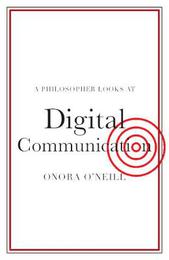
|
A Philosopher Looks at Digital Communication
Paperback / softback
Main Details
| Title |
A Philosopher Looks at Digital Communication
|
| Authors and Contributors |
By (author) Onora O'Neill
|
| Series | A Philosopher Looks At |
|---|
| Physical Properties |
| Format:Paperback / softback | | Pages:150 | | Dimensions(mm): Height 197,Width 130 |
|
| Category/Genre | Ethics and moral philosophy |
|---|
| ISBN/Barcode |
9781108986816
|
| Classifications | Dewey:175 |
|---|
| Audience | |
|---|
| Illustrations |
Worked examples or Exercises
|
|
Publishing Details |
| Publisher |
Cambridge University Press
|
| Imprint |
Cambridge University Press
|
| Publication Date |
10 February 2022 |
| Publication Country |
United Kingdom
|
Description
Communication is complicated, and so is the ethics of communication. We communicate about innumerable topics, to varied audiences, using a gamut of technologies. The ethics of communication, therefore, has to address a wide range of technical, ethical and epistemic requirements. In this book, Onora O'Neill shows how digital technologies have made communication more demanding: they can support communication with huge numbers of distant and dispersed recipients; they can amplify or suppress selected content; and they can target or ignore selected audiences. Often this is done anonymously, making it harder for readers and listeners, viewers and browsers, to assess which claims are true or false, reliable or misleading, flaky or fake. So how can we empower users to assess and evaluate digital communication, so that they can tell which standards it meets and which it flouts? That is the challenge which this book explores.
Author Biography
Onora O'Neill is Honorary Professor Emeritus at the University of Cambridge and a crossbench member of the House of Lords. She is the author of numerous books on Kant, ethics and political philosophy, including Justice Across Boundaries (Cambridge University Press, 2016).
Reviews'This book tackles one of the most crucial ethical issues facing us in the age of online communication and digital information. It is clear, concise and yet deep and insightful.' Maria Baghramian, University College Dublin
|